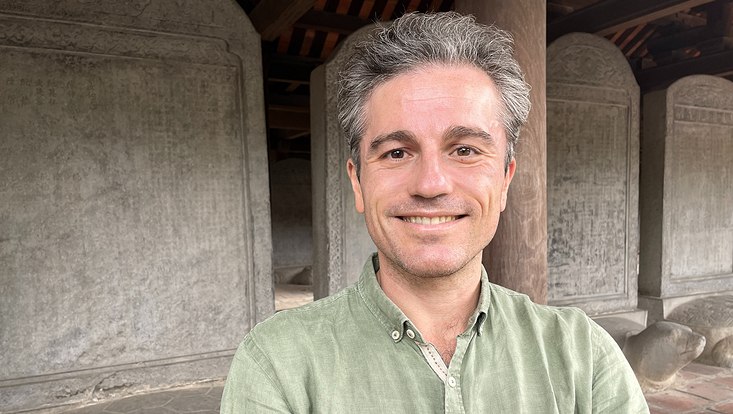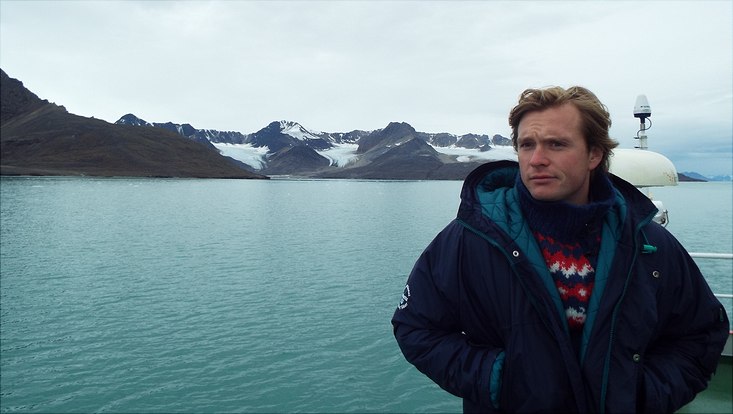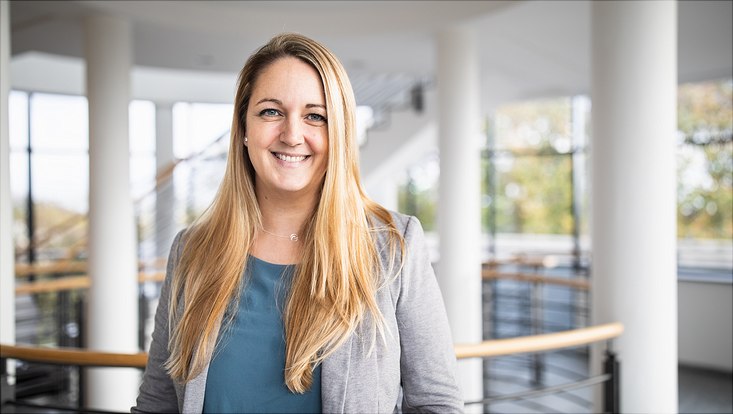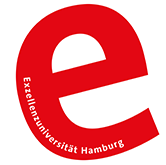“Welcome Aboard!”“I explore the intersection of violent histories and the contemporary politics of ecology”Prof. Dr. Eray Çaylı strengthens the Faculty of Mathematics, Informatics and Natural Sciences
16 February 2023, by Çaylı/Red.

Photo: private
Every year, Universität Hamburg welcomes many new researchers. Here, we present part of a series to introduce them and their areas of research.
Prof. Dr. Eray Çaylı came to the University of Hamburg from the London School of Economics and Political Science in February 2023 to take up a professorship for "Human Geography, with a Focus on Violence and Security in the Anthropocene".
My research area in 3 sentences:
I explore the intersection of violent histories and the contemporary politics of ecology especially in the region around today’s Turkey (where I also was born and grew up) and the diasporas that hail from that region. My work engages critically with “the Anthropocene”—a scientific thesis that has proposed to name our current geological era after humanity (anthropos) as the single most decisive factor shaping the Earth’s workings and physical makeup. I complicate this imaginary of a homogeneous humanity through qualitative methods such as ethnography and an empirical focus on material and visual cultures, showing that “the Anthropocene” has in fact been caused by the authors and beneficiaries of violent political projects and has affected historically marginalized communities disproportionately.
How I explain my work to my family:
This requires some background on the kind of biological family I come from. Both of my parents were born into working class families, were the first generation to receive university education, and then became civil servants (think of what is called the baby boomer generation in the Anglophone world). Because they personally experienced considerable upward social mobility during much of their adult life, they are now terribly worried about all the political and ecological upheaval affecting many parts of our warming and warring world. But this is a particular kind of worry: it involves a sort of grief and despair that leaves unquestioned the founding tenets of the system that gave them their upward mobility. I explain to them that my work encourages them to question these tenets and to empathize and show solidarity with those disadvantaged by the same unjust system that advantaged others (if to varying degrees). Incidentally, I also wrote a whole book in Turkish and for the general public so that my family—both biological and otherwise—could read my thoughts in a language they understand! Titled İklimin Estetiği, the book costs only about €1,50. It won a literary award and has just entered its second print run.
Why I am glad to be in Hamburg, the city, and the University:
I am glad to be working within a higher education system where the vast majority of study programmes are unconditionally tuition-free. I am glad to be working for a university that thinks outside disciplinary boxes. My post was advertised as an “open-topic professorship with a focus on violence and security in a planetary age”—oriented towards an urgent problem rather than a particular discipline. It was this non-disciplinary and problem-focused orientation that caught my attention and led me to apply for the professorship. Although “interdisciplinarity” is on everyone’s lips in today’s higher education, seldom does a university take it so seriously as to incorporate it into institutional mechanisms. Moreover, this University is widely recognized as one of the world’s best universities for climate change research, as evidenced by its numerous research groups and clusters dedicated to this subject. I will be affiliated with one of these clusters (Cluster of Excellence Climate, Climatic Change, and Society or “CLICCS”)—another reason that makes my appointment feel right. Finally, the city itself deserves a mention. It hosts many vibrant communities and sites (urban spaces as well as museums) that are significant to my interests, my ways of working, and the parts of the world I come from and have worked on. In accessing the politics of violence and that of ecology, I use a material, spatial and visual focus because both these politics are markedly embodied. This focus is also reflected in my teaching as I often use embodied (site-based and hands-on) pedagogical methods. Therefore, what Hamburg has to offer in this respect is an enormous plus for my teaching.
My plans for working at Universität Hamburg:
Among my plans are the usual ones that any academic’s life involves, such as articles and books in progress, grant applications, and ideas for symposia, conferences, lecture series, and the like. Mine currently revolve around the notion of emergency. As evidenced by the expression “the climate emergency,” the notion of emergency figures increasingly prominently in approaches to climate change today. My ongoing projects intend to appraise this notion in relation to specific political traditions of emergency rule that prioritize securing states and capital (rather than the most vulnerable) and that tend to find their way into mainstream responses to climate change. These personal plans aside, the one plan that I am most excited about and wish to prioritize involves collaborating with colleagues—especially those at CLICCS. I am eager to see how my research interests and plans can not only contribute to their work but also be rethought and reworked in conversation with theirs so that we may approach the problems facing us collaboratively and dialogically, which really is the only way we can hope to achieve any progress.
Why students should attend my lectures:
I approach teaching as a dialogue rather than a monologue. Even when I lecture, I do my best to be interactive. I believe that students learn as much from one another as they do from teachers. I therefore see my role as the facilitator of as best an environment as possible for thinking, working, and learning together rather than only as the conveyor of information in a single direction. The centrality of site visits and visual materials to my teaching (a centrality that, as I have tried to explain above, is required by the embodied character of both climate change and the legacies of violent histories) benefits this dialogic and interactive approach. I maintain that critical thinking is first and foremost a practical skill—a vocation—and this is why students will find ample opportunities in my classes to develop it as such in collaboration with one another. An added benefit is that, due to my interdisciplinary and ethnographically informed approach, students attending my classes will find the opportunity to work from empirically fine-grained and context-specific understandings to access the urgent problems of our warring and warming world, rather than working from pre-existing disciplinary framings. That, of course, is not to dispute the importance of disciplinary specialisms. But disciplinary specialisation benefits from being complemented by an approach that works from concrete, lived, and embodied situations (rather than disciplines) to then create an environment where various disciplinary framings can converse with one another. Students interested in such an approach should attend my classes.
How I reach out to the world:
For the past twelve years, I have worked in the United Kingdom (the first half of it mainly at University College London and the second at London School of Economics and Political Science) and, therefore, most of my collaborators are based there. I have been a regular contributor to the British Academy’s workshops on violence, one of which resulted in a successful collaborative seed funding application involving academics from Canada as well—a collaboration that is ongoing. In continental Europe, I have had sustained working relationships with academics based at Wageningen University (the Netherlands) and Goethe University Frankfurt here in Germany and, in the US, those based at Syracuse University. Having worked mostly on Turkey to date, I have collaborated with universities there as well. I am very much committed to engaging non-academic audiences in my work as collaborators, too. I frequently collaborate with nongovernmental organisations, independent research and education institutions, arts and culture institutions, and professional organisations whose work relates to ecology.
Why my research is important to society:
The first reason concerns clarifying the relationship between the politics of ecology and all other burning issues of socio-political significance. Those in power around the world now by and large acknowledge that ours is a historical juncture where climate change and environmental disasters require urgent action. But when it comes to precisely how this action ought to be taken, they tend to resort to habit, effectively continuing business as usual but with a green hue. Doing so deepens racial, class-based, and gendered disadvantages that the systems dominating our world have inflicted. Addressing the planetary ecological crisis facing us today is neither a luxury nor disconnected from other major socio-political problems. Addressing these problems and addressing climate change are one and the same imperative. That my research addresses them as such makes it societally important. The second reason has to do with how I interweave questions around cultural expression with pragmatic and systemic concerns. Research and thinking on the subjects I explore in my work have for far too long adhered to a distinction between soft and hard sciences. Addressing systemic issues has been seen as the preserve of the “hard” while that which is particular and cultural has been considered the domain of the “soft.” But the current historical juncture that has exposed the intimate links between violent histories and the politics of ecology requires us to work from the particular to arrive at the planetary and to consider cultural expression not only as a symbolic question but also for its systemic and pragmatic implications. Violent histories have created epistemic and political hierarchies that have at worst seen certain lives as disposable and have at best cherry-picked aspects of marginalized communities’ ways of life as cultural particularities by extracting them from their socio-political contexts where they are charged with systemic and pragmatic significance. What is at stake in the imbrication of violent histories and the politics of ecology is therefore how life itself is understood and practiced—what could be more important to society than that!
Open-Topic Professorships
As part of the Excellence Strategy of the Federal and State Governments, Universität Hamburg—University of Excellence has appointed three open-topic professorships. The newly appointed professors are intended to help turn profile initiatives into emerging fields. Eray Çaylı takes up one of these open-topic professorships. The professorship is based in the profile initiative Violence and Security.



